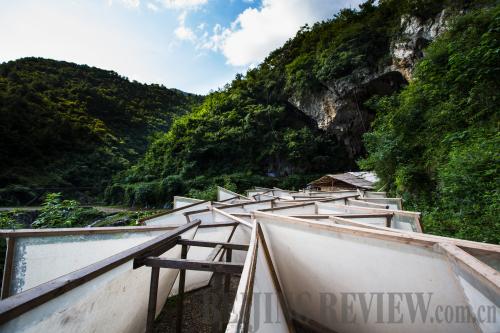|
 |
|
NATURAL PLANT: Handmade paper hangs to dry outside a karst cave, which is home to the Shiqiao Qianshan Ancient Papermaking Cooperative at the foot of a hill in the mountainous Shiqiao village in Danzhai County, Guizhou Province (WAN QUAN) |
"Gui paper has a kind of rough texture and unadorned beauty," said Hu Shipeng, a well-known painter in Guiyang, capital of Guizhou Province.
In addition, Wang said, because its fiber is much longer, Gui paper is much more pliable than the rice paper. "When you pull out a sheet of Gui paper from water, it can be painted on directly and will not break," said Wang.
Yingchun paper is named after Fu of TAG for his contribution to the preservation of Shiqiao papermaking techniques.
Yingchun paper is mainly used for restoration of ancient books. "Paper used to restore ancient books must be mildly alkaline with a potential of hydrogen value between seven and eight," Wang explained. With the help of restoration experts such as Professor Yue Qianshan of CCAFA and Xu Heng of Guizhou University, Wang developed handmade replicas of ancient paper.
"Experts estimate that Yingchun paper can be kept for about 1,500 years, making it a good fit for book restoration projects," Wang said.
Wang said the paper is of such high quality because the entire process, from raw materials to the construction, is totally natural and pollution-free. "The waste from our papermaking can be used for crop field irrigation," said Wang. "In addition, Yingchun paper is handmade, which means the fibers of the material are not damaged during the process."
Mechanized paper production takes only a few days, but from collecting material to drying the paper, Shiqiao papermaking requires about 45 days. "The Shiqiao method is very detailed and complicated. That is why our product is unique," said Wang.
When foreign travelers first saw the ancient papermaking technique, they were impressed with the careful attention to detail, and some placed orders for the paper. According to Wang, his products have been exported to Australia, the United States, France, Japan and other countries. A French businessman has also signed a long-term cooperation agreement with him.
In recent years, as Shiqiao paper has been exported to foreign countries, many foreign visitors have arrived to the village for tours.
In 2006, Shiqiao papermaking was inscribed on the state-level cultural heritage protection list. Later, Wang was honored as bearer of the ancient technique.
More investment needed
In 2008, altogether 61 families in Shiqiao headed by Wang established the SQAPC, aiming for large-scale operation and expanded development.
Currently, a total of 66 workers are employed in the SQAPC with an average annual output of about 100,000 sheets of paper.
"We still lack funds, so we don't have a large plant and drying equipment. We rely on the sunshine to dry the paper, so during rainy or winter weather, we cannot work," Wang said. "Though we have excellent technique and big market, we don't have the money to buy drying equipment to expand production."
Wang said his product is now popular both domestically and in some overseas markets. The annual demand for Yingchun paper from the National Library of China, for example, is more than 10 million sheets, but his workshop can only provide a small fraction of the total demand.
Wang hopes some businesspeople could cooperate with the project and invest in his company.
"If we get enough investment to build a new plant to expand our business, we can greatly increase our efficiency and output," Wang said.
At present, Wang has six young men working as his apprentices. He hopes they could become successors of the craft and carry forward Shiqiao's papermaking business. "My dream is to make the best paper in the world," Wang said.
Email us at: yulintao@bjreview.com | 